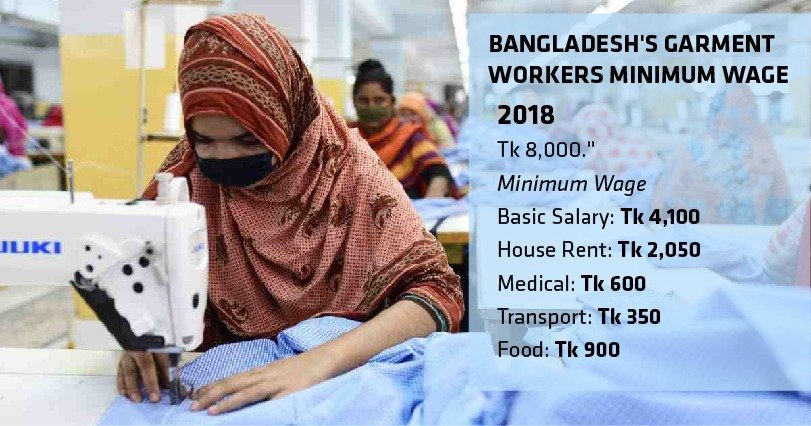Wage increases will only occur when the overall productivity of Bangladesh’s economy is on par with that of affluent nations boasting high levels of productivity.
The wages of Readymade Garment (RMG) employees have become a central topic of extensive discourse and concern, especially in developing countries. RMG workers play a pivotal role in producing clothing and textiles for the global market. In addition to the government’s efforts to enhance minimum wages and labor conditions in the textile and garment sector, the primary goal is to safeguard the rights and welfare of RMG workers. However, wages are fixed in line with the larger economic context and productivity of our country.
Recently, a group of diplomats and officials from wealthy nations gathered to voice concerns over the minimum wages in Bangladesh’s Ready-Made Garment (RMG) sector, demanding an increase to Tk 8,000 per month. While this may seem like a noble endeavor, it’s essential to examine whether such demands are rooted in economic understanding or are merely wishful thinking.

Role of Developed World Diplomats
Developed world diplomats are influential individuals who may not have experience managing wage bills or navigating complex economic systems. Their input on how an economy should be planned is well-intentioned but can sometimes lack a nuanced understanding of the dynamics at play in a developing economy like Bangladesh.
Wages Determined by Market Forces
One fundamental economic principle is that wages are not solely determined by employers but by the entire labor market. In essence, wages are not contingent on the productivity of individual workers but on the average productivity of the economy as a whole. This is a concept even Nobel laureate Paul Krugman has emphasized, particularly regarding Bangladeshi RMG factories.
In his essay “Ricardo’s Difficult Idea,” Krugman notes that some Bangladeshi apparel factories achieve labor productivity nearly half that of comparable U.S. installations. However, the overall productivity in Bangladesh is only around 5% of the U.S. level. Krugman’s key insight is that wages are determined within the context of a national labor market. In other words, wages in a particular job are not dictated by the job itself but by the best wages offered elsewhere.
Global Wage Gradient
To better understand this, consider the global wage gradient. The barber in Dhaka, who uses the same tools as a barber in England, receives a lower wage than his counterpart in Dudley. Similarly, a bus driver in Sweden earns more than one in Dhaka, despite the former’s job likely being less demanding due to Sweden’s better infrastructure and traffic management. These disparities exist because the average wages in these countries differ significantly, driven by variations in labor productivity.
In 2023, the minimum wage in Bangladesh remained at 8000 BDT per month, equivalent to approximately 72.683 USD per month. In stark contrast, Sweden set its minimum wage at SEK 26,560 per month, which is approximately 2427.55 USD per month.
Role of National Productivity
The primary reason for lower wages in Bangladesh is lower labor productivity. The income derived from employing a person in a less productive economy is inherently less than that in a more prosperous one. Simply put, the wages you can command in your current job are determined by the wages you can earn elsewhere, based on the average productivity in your country.
Increasing Wages by Enhancing Productivity
What Developed-world diplomats often overlook is that pontificating about wage increases at meetings will not substantially impact the RMG sector. Instead, raising wages requires increasing the overall productivity of labor in Bangladesh. Paul Krugman highlights this by asking, “What would happen if people who work for such low wages manage to achieve Western productivity?” The answer, according to economists, is that they would be paid Western wages.
To the layperson, this conclusion may seem unnatural, but it is rooted in economic logic. Productivity is the key to unlocking higher wages, and focusing on improving productivity at the national level is the most effective means of ensuring wage growth. When Bangladesh becomes a prosperous nation with high labor productivity, high wages will naturally follow.
Conclusion
The well-intentioned demands for higher minimum wages in Bangladesh’s RMG sector, coming from develop-world diplomats, often overlook fundamental economic realities. The determinants of wages are complex and interconnected, tied to the productivity of the entire economy. To effect real change and boost wages, the focus should be on enhancing national productivity rather than well-intentioned but misguided exhortations. In the end, the path to higher wages lies not in speeches but in building an economy that produces valuable goods and services that the world wants to buy.


